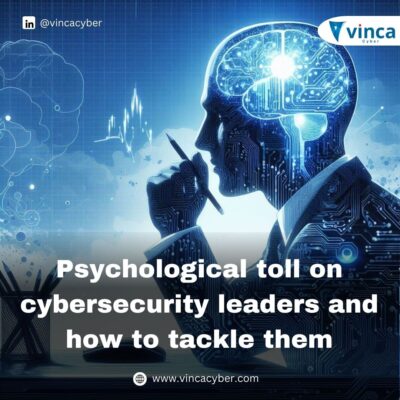Cybersecurity is a challenging and stressful field that demands constant vigilance, innovation, and adaptation. Cybersecurity leaders, such as CIOs, CISOs, CEOs, and IT heads, face immense pressure to protect their organizations from ever-evolving cyber threats, while also managing the expectations, needs, and demands of various stakeholders. The consequences of stress and burnout extend beyond the well-being of cybersecurity leaders themselves. They can also have a detrimental impact on decision quality and the performance of their teams. When individuals are under high levels of stress, their cognitive abilities, including critical thinking, problem-solving, and decision-making, can be compromised. This can lead to errors, oversights, and lapses in judgment, putting organizations at greater risk.
At Vinca Cyber, we understand the psychological toll of cybersecurity leadership and we are committed to helping our clients and partners cope with it. We believe that cybersecurity is not only a technical challenge, but also a human one. That is why we offer holistic and human-centric solutions that address the human factors in cybersecurity, such as strategic communication, human–computer interaction, organizational factors, social environments, and security awareness training.
Here are some of the ways we can help you reduce the psychological toll of cybersecurity leadership and enhance your resilience, effectiveness, and well-being:
- Strategic communication: We help you communicate effectively with your stakeholders, such as senior management, board members, customers, employees, and regulators, about the cybersecurity risks, challenges, and opportunities facing your organization. We help you craft clear, concise, and compelling messages that convey the value and impact of your cybersecurity initiatives, as well as the rationale and evidence behind your decisions. We also help you solicit and incorporate feedback, suggestions, and support from your stakeholders, as well as address any concerns, questions, or objections they may have. Effective communication can help you build trust, credibility, and confidence among your stakeholders, as well as reduce uncertainty, ambiguity, and anxiety. Communication can also help you align your stakeholders’ expectations and perceptions with the reality and complexity of cybersecurity, as well as educate them about their roles and responsibilities in cybersecurity.
- Human–computer interaction: We help you design and implement user-friendly and intuitive cybersecurity systems and tools that enhance the usability, efficiency, and satisfaction of your users. We apply the principles and best practices of human–computer interaction, such as user research, user interface design, user testing, and user feedback, to ensure that your cybersecurity systems and tools meet the needs and preferences of your users, as well as the goals and requirements of your organization. We also help you train and educate your users on how to use your cybersecurity systems and tools effectively and securely. User-friendly and intuitive cybersecurity systems and tools can help you improve the user experience and engagement, as well as reduce user frustration, confusion, and errors. They can also help you increase user compliance, adoption, and retention, as well as foster a positive and proactive cybersecurity behavior and culture among your users.
- Organizational factors: We help you create and foster a positive and productive cybersecurity culture within your organization. We help you align your cybersecurity vision, mission, values, and goals with your organizational strategy, culture, and objectives. We also help you establish and maintain effective cybersecurity governance, policies, processes, and procedures that ensure accountability, transparency, and compliance. We also help you empower and motivate your cybersecurity team by providing them with the resources, guidance, support, and recognition they need and deserve. A positive and productive cybersecurity culture can help you enhance the cohesion, collaboration, and performance of your cybersecurity team, as well as the morale, commitment, and loyalty of your cybersecurity team members. It can also help you attract and retain talented and skilled cybersecurity professionals, as well as create a sense of shared ownership and responsibility for cybersecurity among your organization’s members.
- Social environments: We help you build and sustain a strong and supportive cybersecurity network within and outside your organization. We help you connect and collaborate with your peers, mentors, experts, and partners in the cybersecurity field, as well as other relevant domains, such as business, law, and psychology. We help you leverage the collective wisdom, experience, and insights of your cybersecurity network to enhance your learning, innovation, and problem-solving. We also help you share and exchange your knowledge, skills, and perspectives with your cybersecurity network, as well as contribute to the advancement and development of the cybersecurity field. A strong and supportive cybersecurity network can help you expand your horizons, perspectives, and opportunities, as well as reduce your isolation, stress, and burnout. It can also help you cope with the challenges, difficulties, and uncertainties of cybersecurity, as well as provide you with emotional, social, and professional support.
- Security awareness training: We help you raise and maintain the security awareness and behavior of your users, customers, and employees. We help you design and deliver engaging and effective security awareness training programs that educate your users, customers, and employees about the cybersecurity risks, threats, and best practices relevant to your organization and industry. We also help you measure and evaluate the impact and outcomes of your security awareness training programs, as well as provide feedback and recommendations for improvement. Security awareness training can help you increase the security knowledge, skills, and attitudes of your users, customers, and employees, as well as reduce their vulnerability and susceptibility to cyberattacks. It can also help you influence and shape their security behavior and culture, as well as foster a sense of security ownership and responsibility among them.
At Vinca Cyber, we believe that cybersecurity leadership is not only a technical challenge, but also a human one. That is why we offer holistic and human-centric solutions that address the human factors in cybersecurity. We are not just a vendor, but a partner in your success. We are here to help you cope with the psychological toll of cybersecurity leadership and enhance your resilience, effectiveness, and well-being. Contact us today to find out how we can help you.

